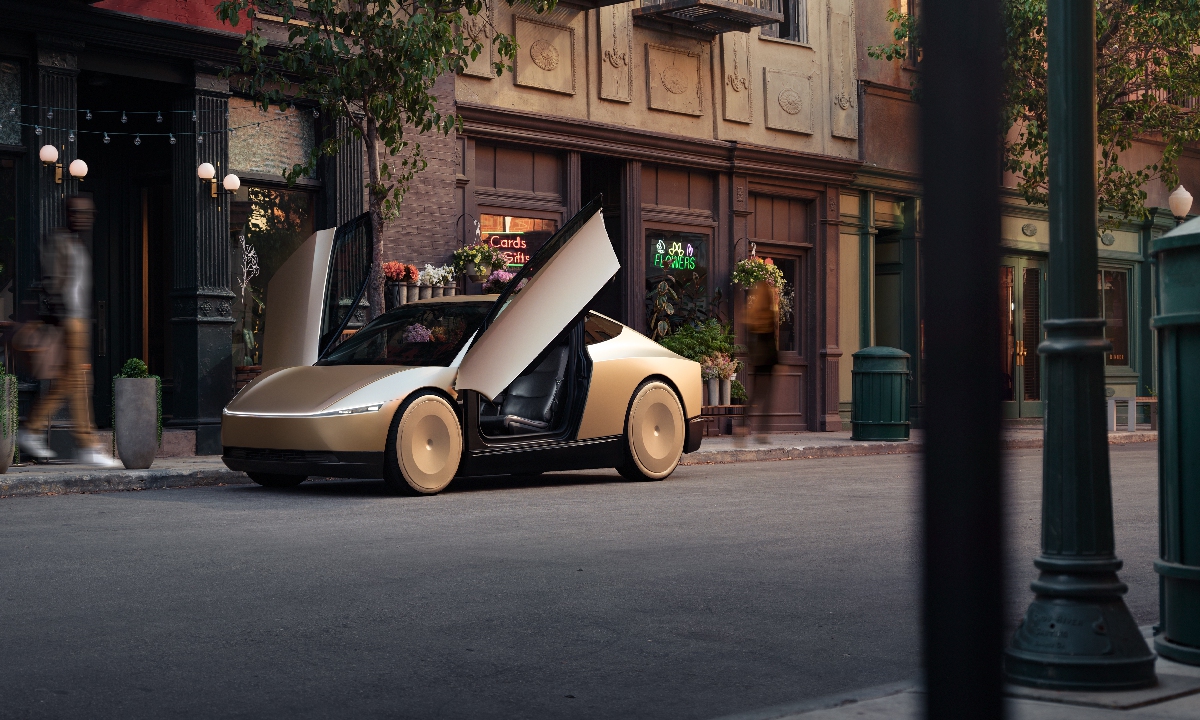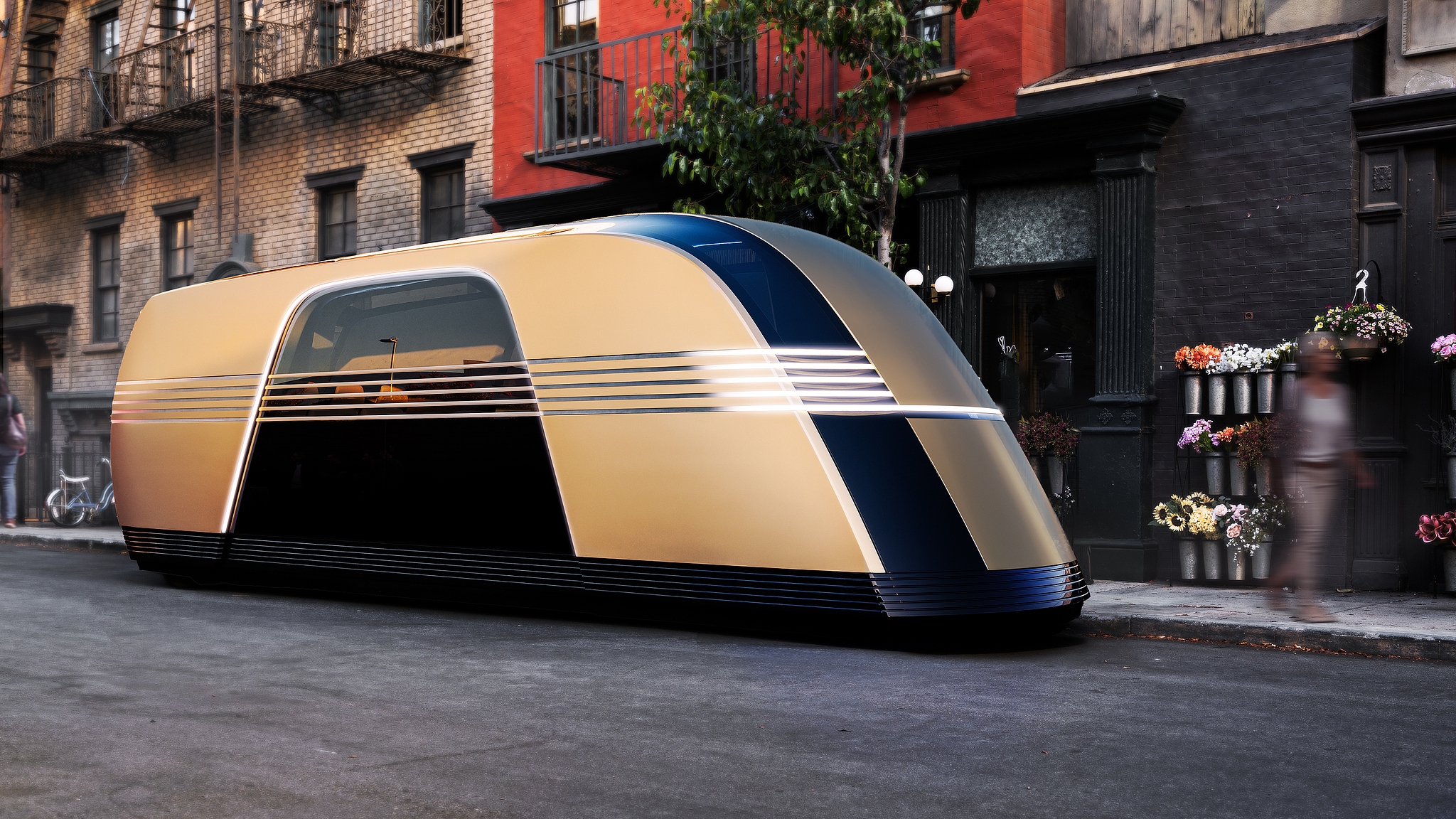
Photo: VCG
After months of delays, Tesla unveiled its driverless taxi named CyberCab on Friday, marking a new milestone in the global autonomous driving competition led by China and the US. Chinese industry analysts expect this would benefit the overall industry development in China's open and competitive market environment.
The Robotaxi, introduced as a concept car without a steering wheel and pedals, is projected to be priced under $30,000 and is set for a rollout in 2026.
Following Google's Waymo and GM's Cruise, the US autonomous driving industry has gained another significant player, positioned as a major contender in the market, according to analysts.
They also noted that Chinese automakers have built a solid technological foundation in both electric vehicles and autonomous driving technology. Embracing market openness and fostering competition is beneficial, and Chinese automakers have demonstrated their strengths in this regard.
"This is the actual interior of the Robobus/van," Elon Musk wrote on Chinese social media Sina Weibo on Friday. Musk also posted three pictures of the interior of the Robobus in his post.
"This is an actual robot. I like. This Robobus is very beautiful," one Chinese netizen commented under the post.
"Concise, full of technology, must give a thumbs up," another netizen wrote.
"I watched the press conference yesterday, and it was a bit below expectations, but it still leads in technology," another one said.
Autonomous driving is a key focus for the application of large artificial intelligence models and a crucial aspect of the transformation and advancement of the automotive industry. Chinese companies are also thriving in this area.
On Wednesday, reports indicated that Chinese company Baidu is set to unveil its Apollo autonomous driving open platform, which will be equipped with Baidu's latest Autonomous Driving Foundation Model (ADFM). This marks the world's first large-scale autonomous driving model capable of supporting L4-level driverless applications.
In May of this year, the sixth-generation driverless vehicle from Apollo-Go Robotaxi entered mass production, with its cost reduced to around 200,000 yuan ($27,000). It has already commenced road testing and will be deployed for actual use soon. Previously, Apollo-Go Robotaxi fulfilled 7 million rides across China.
China has significant development advantages in the field of autonomous driving, including a vast automotive market, complete infrastructure, gradually improving policy standards, and a relatively strong technological base.
China's related industrial supporting facilities and policies are fueling the rapid development of Chinese autonomous driving companies, Wu Shuocheng, a veteran automobile industry analyst, told the Global Times on Saturday.
Meanwhile, the Chinese market remains crucial for Tesla. In August 2024, Tesla sold 63,500 vehicles in China, accounting for 44.20 percent of its global sales and surpassing the US as the world's top market that month.
"The Chinese automotive market has always remained open and welcomes foreign competitors to participate. Practice has proved that this open policy has not weakened the local automotive industry but has promoted the rapid development of the industrial chain and overall market growth," Wu said.
In September this year, Tesla announced that after securing regulatory approval from Ministry of Industry and Information Technology in China, it plans to launch its FSD assistant software in China and Europe in early 2025.
According to forecasts by the Forward Industry Research Institute, by 2030, the market size of China's intelligent connected vehicles is projected to surpass 5 trillion yuan, and the related sector for "vehicle-road-cloud integration" will exceed 14 trillion yuan.
Several Tesla humanoid robots showed up at the event, with Elon Musk revealing significant progress on Tesla's humanoid robot, Optimus. At the event, Optimus mingled with the crowd, serving drinks at the bar and engaging in conversations with attendees.
Musk emphasized that the key difference between Tesla's humanoid robots and its cars is the use of legs instead of wheels. He envisions Optimus becoming a common feature in homes worldwide, with prices potentially dropping to as low as $20,000-$30,000 ̶ making them cheaper than cars. Designed to assist with everyday tasks, from childcare and dog-walking to grocery shopping and lawn mowing, Optimus aims to revolutionize home automation.

Photo: CFP





